by Alicia Balfrey
This city touts itself as a progressive-minded, inclusive community, but if you pay attention, this can show up as white, elitist, NIMBY liberalism. Eugene is overwhelmingly white, making up 81.1 percent of the population, according to recent census data; so how can we pretend to call ourselves diverse or inclusive?
Sure, visitors in town will notice Pride flags and Black Lives Matter signs in the windows of local businesses, but after staying awhile they’d notice how attitudes toward marginalized communities are, at best, blissfully ignorant, and at worst, disdainful; the city’s treatment of the unhoused community is a perfect example.
Remember the World Athletics Championships debacle last summer? The city did its best to ensure there was little evidence of our growing unhoused population, yet failed to attract the thousands of visitors to any local businesses outside of the University of Oregon area. Huge fumble.
White liberalism shows up in Eugene in several ways, but one that isn’t discussed enough is the alarming number of anti-Asian incidents my loved ones have experienced here. As a mixed-race but white-passing, middle class, educated woman, I recognize the privilege that allows me to thrive here, but my Taiwanese mother experiences discrimination in this town on a regular basis — exacerbated by the increased xenophobia towards Asians emerging from the pandemic.
Some of my mom’s experiences: When out with friends, being told to “speak English” and receiving sub-par service compared to other patrons, specifically at a few notable 5th Street Public Market businesses; moving from her condo after experiencing discrimination from her neighbors, including one woman yelling, “Go back to China” from her window; people scowling and covering their faces during the peak of COVID-19 upon seeing my mom’s Asian features, despite being outside and dozens of yards away (and not doing the same with me); a grocery store employee refusing to let her use coupons because he “couldn’t understand what she was saying.” The list goes on.
Milder examples include the classic microaggressions of people speaking loudly and slowly to her, and the need for me to accompany her during large purchases to ensure she isn’t being taken advantage of (in which case the salesperson pointedly talks to me instead of her, despite it being her dollars to spend).
A more serious example includes local Asian organizations canceling gatherings due to fear of violence, including my mom canceling Lunar New Year plans with her local Taiwanese group after the recent shootings in L.A. If your first thought after reading that sentence was, “Wasn’t the shooter also Asian?” you might be in the “blissful ignorance” group I mentioned earlier.
Regardless of the color of the person’s skin, hate crimes like this are fueled by structural racism and indicate a systemic issue in the way people of color are treated in this country. Stop AAPI Hate, a coalition that tracks and responds to incidents of hate toward Asian Americans and Pacific Islanders (AAPI) in the United States, reported 11,467 hate incidents between March 19, 2020, and March 31, 2022, and found that “one in five Asian Americans and one in five Pacific Islanders experienced a hate incident in 2020 or 2021.” If your reaction to that was, “What a shame,” I urge you to consider what it would be like to live in fear because you or someone you love happens to look Asian. This is not just shameful. It’s terrifying.
If you asked someone in town how Asian culture shows up in Eugene, they would probably comment on the food options we have, of which there are many, though some have been vandalized repeatedly. Perhaps they would mention the annual Asian Celebration. Maybe their kid learned about Lunar New Year in school. What else? We are more than our food and yearly celebrations. Where is the (non-tokenized) representation in our city? Our government? Our school boards? Who will speak up about the anti-Asian hate happening not only on a national level, but in our own community? It can’t be the sole responsibility of the local AAPI community, so I’m asking you to take action, as well. Anti-racism begins with self-awareness, so consider these self-reflection questions:
Is your knowledge of AAPI culture limited to food and Lunar New Year?
Do you have AAPI representation in your social circles?
Do you follow AAPI creatives? When was the last time you read a book, watched a film or listened to music from the AAPI community?
When you were in school, did you have AAPI teachers? Do your children have AAPI teachers?
If you use social media, do you follow AAPI content creators?
What is your first thought when you encounter someone of AAPI descent?
What do you believe the AAPI population contributes to our local community?
My mom has lived in this country for over 40 years and worked hard to earn her citizenship. How much longer must she wait to be fully embraced by her local community?
Alicia Balfrey is an Asian American Eugene resident and received her master’s from the University of Oregon. She works in special education to provide training to teachers and serves as her organization’s diversity manager.
